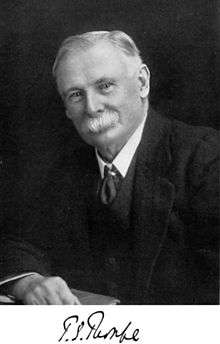Thomas Edward Thorpe


Sir Thomas Edward Thorpe CB, FRS, often called Edward Thorpe, (8 December 1845 – 23 February 1925) was a British chemist.[1]
Born in Harpurhey, Manchester, Thorpe originally worked as a clerk, but in 1863 began working as an assistant to Henry Roscoe, a professor of chemistry at Owen's College. Thorpe then studied for a PhD at the University of Heidelberg, and after a time working for August Kekulé in Bonn returned to Britain to accept a Chair at Anderson's University in Glasgow in 1870. He later held posts at the Yorkshire College of Science and the Normal School of Science, South Kensington (later the Royal College of Science).
Thorpe conducted research on a wide range of subjects. He contributed to the understanding of the relationship between substances' molecular weights and their specific gravities, and his work on phosphorus compounds led to a better understanding of phosphorus trioxide and the prevention of the illnesses it caused to workers in the match industry. Thorpe's work on the atomic weights of metals led to the award of a Royal Medal in 1889, and in 1902 Thorpe was elected member of the newly created International Atomic Weights Commission. He was the president of the British Association for 1921–1922.[2] He also took part in four eclipse expeditions, and a magnetic survey of the British Isles.
In 1895 Thorpe served as president of the Society of Chemical Industry.[3] He left academia in 1894 to take up a government post as principal of Somerset House Laboratory, also known as the Government Laboratory, originally established in 1842 for the prevention of the adulteration of tobacco products and then enhanced by the 1875 Sale of Food and Drugs Law.[4] In this post from 1894 to 1909, he moved the government laboratory in 1897 from Somerset House to a new building of his own design and helped to further the effectiveness and reputation of this government laboratory. With his staff Thorpe worked on matters of public health, including the detection of arsenic in beer, and the elimination of lead from pottery. His successor as principal chemist of the Government Laboratories was James Johnston Dobbie.
Thorpe wrote a number of books, including the textbooks Inorganic Chemistry (1873), Dictionary of Applied Chemistry (1890) and a History of Chemistry (1909). Outside chemistry, his great interest was yachting,[5] and he wrote two books on this subject; A Yachtsman's Guide to the Dutch Waterways (1905) and The Seine from Havre to Paris (1913).
Thorpe was appointed a Companion of the Order of the Bath (CB) in the 1900 Birthday Honours.[6] He died of a heart attack in 1925, and was buried in Salcombe, Devon.
Further reading
- P. W. Hammond, 'Thorpe, Sir Thomas Edward (1845–1925)', Oxford Dictionary of National Biography, Oxford University Press, September 2004; online edn, January 2008 doi:10.1093/ref:odnb/36514, accessed 13 February 2008
- Geo. Stubbs (1925). "Obituary: Thomas Edward Thorpe". Analyst. 50 (590): 210–213. doi:10.1039/AN9255000210.
- A. E. H. T. (1925). "Obituary Notices of Fellows Deceased". Proceedings of the Royal Society of London. Series A. 109 (752): i–xxix. JSTOR 94442. doi:10.1098/rspa.1925.0144.
References
- ↑ "Thorpe, Sir Edward". Who's Who: p. 2370. 1918.
- ↑ Thorpe's Presidential Address to the British Association Meeting, held at Edinburgh in 1921
- ↑ Addison, Henry Robert; Oakes, Charles Henry; Lawson, William John; Sladen, Douglas Brooke Wheelton (1907). "THORPE, Thomas Edward". Who's Who. Vol. 59. p. 1748.
- ↑ Michael French; Jim Phillips (2 September 2000). Cheated Not Poisoned?: Food Regulation in the United Kingdom, 1875-1938. Manchester University Press. pp. 45–. ISBN 978-0-7190-5605-5.
- ↑ Tutton, A. E. H. (7 March 1925). "obit. Sir Edward Thorpe. C.B., F.R.S.". Nature. 115 (2888): 343–345. doi:10.1038/115343a0.
- ↑ "No. 27200". The London Gazette. 8 June 1900. pp. 3629–3630.